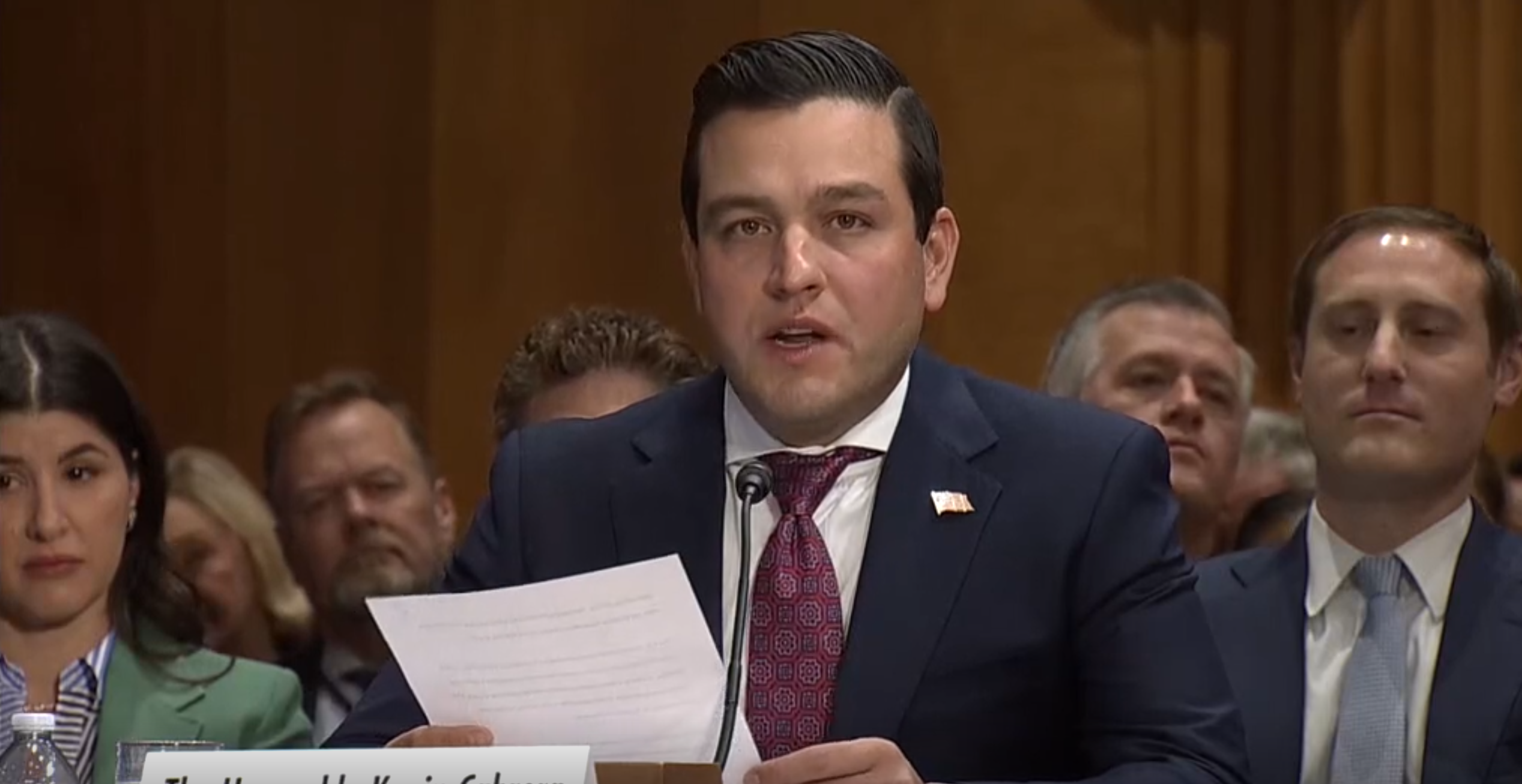Miami-Dade County Commissioner Kevin Marino Cabrera faced a fairly friendly audience as he spoke to Senators at his confirmation hearing to become U.S. Ambassador to Panama.
During the hearing, Cabrera fielded questions from both sides of the political aisle on how he views his potential role. Things never grew heated and featured only one potentially contentious exchange. Otherwise, the discussion centered solely on policy, particularly how Cabrera planned to implement President Donald Trump’s agenda for the Central American nation, its pivotal canal, foreign influence on trade, immigration and drug trafficking.
Asked about Trump’s calls for the U.S. to reclaim control of the Panama Canal for national security purposes, Cabrera said his job would be to “serve at the pleasure of the President” and reiterated Trump’s assertion that “all the options are on the table.”
“Part of ‘all the options’ includes diplomacy,” he said, adding, “President Trump is our Commander in Chief, and I stand behind him and his policies.”
Cabrera, a government relations specialist who led Trump’s 2020 campaign in Florida and was elected last year as a Republican State Committeeman, emphasized his nonpartisan work on the 13-member Miami-Dade Commission, where he has served for the past two and a half years.
He said cross-aisle support he enjoyed in his ambassadorial candidacy from Miami-Dade Mayor Daniella Levine Cava and Commission Vice Chair Kionne McGhee, both Democrats, and others from all political stripes.
He stressed that as an Ambassador, he would endeavor to fulfill Trump’s foreign policy mandate to make the U.S. “stronger, safer and more prosperous” while doing his best to maintain the Panama Canal’s neutrality.
But there are concerns. The Chinese Communist Party has exercised increased influence on the region and Panama, which Cabrera noted was both the first Central American country to enter and leave China’s massive Belt and Road infrastructure initiative.
China’s tendrils are likely still embedded there, Cabrera said.
“You’ve seen it in cities like Colón, with the cybersecurity grants (China gave) for cameras in the area. You don’t know where that cloud information might be stored, who has access to it, and some of the reports were they have cranes that have been given to them by the Chinese government as well,” he said.
“As a County Commission, we have seen where many times (foreign entities, working through a local business proxy, will) underbid these sorts of things to get their cranes in there by a significant (discount). A lot of these companies are partially government (owned).”
One way the U.S. can counteract China’s influence, he argued, is through economic diplomacy.
“When (American companies) compete, they win, because we have a better product,” he said. He added that China’s sponsorship of Confucius Institutes at all five public universities in Panama and its relationship with government-run TV stations, which “never criticize China,” still pose challenges.
Cabrera said that a lot of work remains to be done to crack down on trafficking and illegal migration, but much has already been accomplished under Trump and Secretary of State Marco Rubio over the past 60 days, including a 95% drop in crossings through the Darién Gap, a 60-mile roadless stretch or rainforest on the Colombia-Panama border.
That’s a big deal, he said.
“This is an area where two years ago, you had over 500,000 folks crossing, “he said. “Stopping migration … helps us at the southern border and helps America to make sure these drugs aren’t infiltrating.”
For the most part, the Senate Foreign Relations Committee’s hardest questions were reserved for former Arkansas Gov. Mike Huckabee, Trump’s pick for Israel Ambassador, and his efforts to distance himself from his past rhetoric on the Israel-Palestinian conflict.
Huckabee and Cabrera fielded questions Tuesday alongside Reed Rubenstein, who served as Deputy Associate Attorney General during Trump’s first administration and is pending confirmation as a Department of State legal adviser now.
Early into the hearing, U.S. Sen. Tim Kaine of Virginia, who was Hillary Clinton’s running mate against Trump in 2016, asked about a 2018 incident in which Cabrera, then working as a lobbyist, was caught on video protesting alongside members of the far-right Proud Boys group outside the office of former U.S. Rep. Donna Shalala.
Cabrera has repeatedly maintained that he was exercising his First Amendment rights and denounced the Proud Boys and “any group that espouses any sort of hate.” He repeated that statement, verbatim, when Kaine asked him to condemn the Proud Boys.
“I believe there is no place for (hate), and we have to work together, and I think it would make for a better world,” he said.
Kaine thanked him for being clear on the matter.
Trump tapped Cabrera, who serves as Vice Chair of the Miami-Dade International Trade Consortium, to be his Panama point person in late December, writing on Truth Social that Panama was “ripping (the United States) off on the Panama Canal, far beyond their wildest dreams.”
“Kevin is a fierce fighter for America First principles,” Trump wrote. “Few understand Latin American politics as well as Kevin — he will do a FANTASTIC job representing our Nation’s interests in Panama!”
A vote on his confirmation will occur at a to-be-determined date.
Post Views: 0

 Entertainment8 years ago
Entertainment8 years ago
 Politics8 years ago
Politics8 years ago
 Entertainment8 years ago
Entertainment8 years ago
 Entertainment8 years ago
Entertainment8 years ago
 Tech8 years ago
Tech8 years ago
 Tech8 years ago
Tech8 years ago
 Tech8 years ago
Tech8 years ago
 Politics8 years ago
Politics8 years ago









